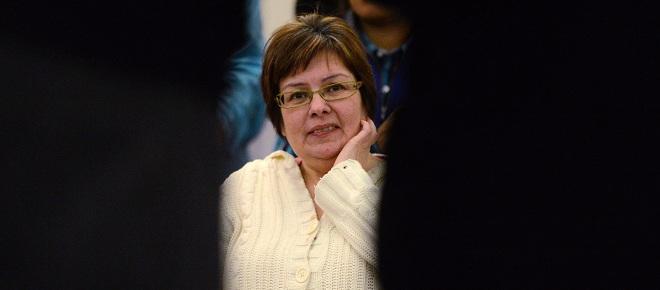Theresa Spence and questions of legacy
Tease the day: Attawapiskat chief doesn’t find much sympathy in the morning papers
Attawapiskat Chief Theresa Spence speaks at a news conference in Ottawa on Thursday, Jan. 24, 2013 after being released from hospital following an overnight stay. She was held for observation after she ended her six-week hunger protest. THE CANADIAN PRESS/Sean Kilpatrick
Share

Theresa Spence strolled into an Ottawa hotel yesterday, where she was celebrated by her peers as having accomplished something extraordinary during her weeks-long protest on Victoria Island. The chief of the Attawapiskat First Nation, who our Aaron Wherry called the most influential woman in the country as she prepared to leave town, returns to her reserve having caused quite a stir. For many weeks, Spence’s cause was bolstered by sympathetic voices in the papers, columnists who were occasionally uncritical. Today, you’ll find not much sympathy remains.
The Toronto Star‘s editorial board is a holdout in its support of the chief. This morning, the paper writes that Spence can leave town “with her head high,” calls her fast “courageous,” and suggests that she deserves a measure of credit for any positive developments on the Aboriginal file. Across town, The Globe and Mail‘s editorial board couldn’t disagree more. The paper argues Spence’s protest “did not feed the debate,” though it did “polarize existing divisions within the first nations leadership and alienate Canadians who felt her tactic was extortionate and went on too long.” Spence only damaged Aboriginal interests, if you believe the Globe.
Tim Harper, writing in the Star, fell somewhere between the two editorials. Harper thinks Spence deserves part of the credit for forcing a meeting between the prime minister and aboriginal leaders, and also keeping Idle No More in the news for weeks. But as to whether or not Spence can claim an “absolute victory,” as her spokesman has suggested, Harper says “the truth is somewhat greyer, frustratingly elusive and somehow deflating.” Whether or not her efforts will bear fruit is, so far, a mystery. Michael Den Tandt, who often praised Spence’s fast, writes for Postmedia that no matter what her contribution—and he says her mishandling of government concessions to her demands caused a “great deal of harm” to Aboriginal momentum—there’s no way to know what it will achieve in the long run, and who will take up the mantle once she leaves Ottawa. In the end, Spence’s exit leaves so many more questions than her entrance to the national stage. Whether or not that becomes her legacy is, well, also a mystery.
What’s above the fold this morning?
The Globe and Mail leads with Canada’s extended commitment of airlift support to France’s mission in Mali. The National Post fronts a bankrupt First Nation in northern Ontario that received emergency federal funding to cover costs. The Toronto Star goes above the fold with Mayor Rob Ford’s fate as chief magistrate, to be decided by a Divisional Court this morning. The Ottawa Citizen leads with Progressive Conservative plans for Ontario’s education system, including a freeze on new all-day kindergarten programs across the province. iPolitics fronts the commencement of voting in the Ontario Liberal leadership race. CBC.ca leads with Ford’s fate. National Newswatch showcases the same CBC story.
Stories that will be (mostly) missed
| 1. Gun registry. Federal documents suggest the government will save about $2 million a year after shutting down its long-gun registration program, short of estimates. | 2. Oil sands. A Canadian subsidiary of a Chinese state-owned energy company will pay a $1.5-million penalty for the deaths of two foreign workers in 2007. |
| 3. Algeria. RCMP officials are on the ground in Algeria in search of evidence that Canadians were involved in coordinating a hostage-taking at a gas plant that left dozens dead. | 4. Ashley Smith. A correctional officer who repeatedly came to inmate Ashley Smith’s aid when she tied ligatures around her neck was reprimanded by superiors for his actions. |